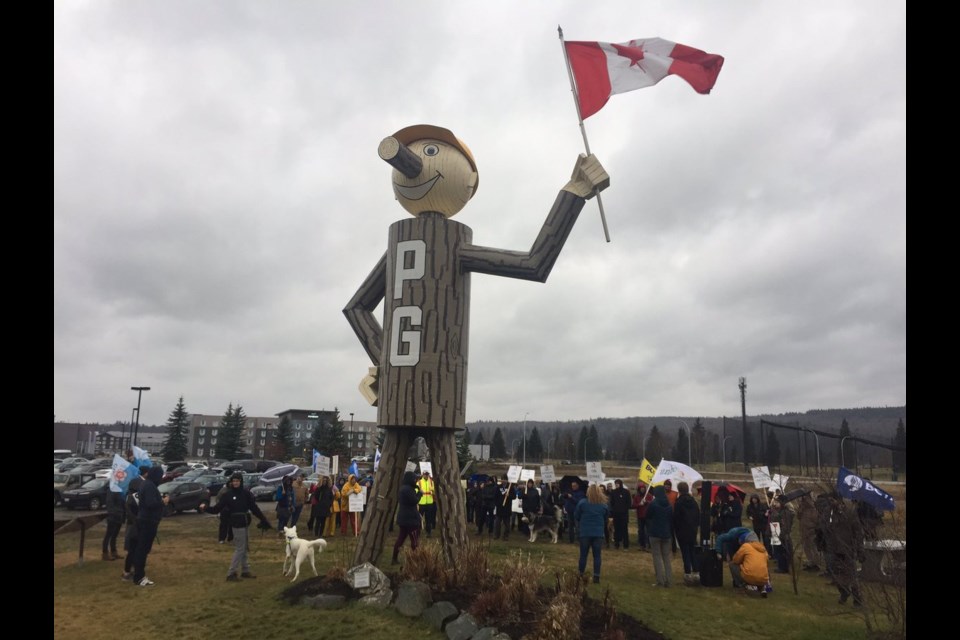Pam Wright has been down this road before and didn’t enjoy the ride the first time.
A 16-year veteran of university classrooms at UNBC as an ecosystems science and management instructor, Wright braved the rain, driving wind and near-freezing temperatures to show her support alongside about 100 of her striking faculty colleagues in the shadow on Mr. P.G. for a noon-hour rally Saturday.
Wright also walked the picket lines just 4 ½ years ago when her fellow professors, lab instructors and librarians walked off the job, less than a year after the UNBC Faculty Association certified as part of a union. That strike lasted two weeks before an arbitrator ordered them back to work.
Now in their 10th day of the current strike, which began last Thursday, Wright is discouraged by the progress of negotiations, which she said could have been avoided had UNBC administration been more willing to address their concerns about instructors’ salaries, which rank among the lowest of any university in Canada.
“We have similar issues as we did in 2015 but they were never resolved because we were arbitrated back to work the last time,” said Wright.
“In the time period between the 2015 strike and this one, things have gotten worse and worse, not just in terms of labour conditions but really with the relationship with the employer. They’re really unresponsive and there’s a lot of talk about reorganizing but no action that does anything except build the administrative side of the situation, so it doesn’t make it better for students, researchers or teachers.”
Wright says teacher recruitment to UNBC is suffering and is concerned about the board’s proposal to take control from the faculty decisions on hiring of new professors and promotions to existing staff.
“We’re really good at being a part of those teams and understanding what we need,” said Wright. “We need upper administrators to care about education and care about teaching and research and they are playing no role except to cut that right now.
“I’m carrying a job-and-a-half right now, teaching for colleagues whose positions have not been filled. It’s hard on the students when that happens as well, when I’m exhausted.”
Rally organizer Rochelle Linde, a masters student and teacher’s assistant in natural resources and environmental studies, said the quality of students’ education is at stake in the dispute and says it’s time for UNBC administration to show they value their teaching staff and what they do to attract students.
“We’re here because we want to be back in class,” said Linde. “We want to encourage administration to treat our professors, senior lab instructors and librarians with the respect they deserve and to bring up our levels of pay for these individuals to parity across the country.
“The fact we’re not at parity is embarrassing and disappointing. I was here in 2015 for the first strike. I did my undergraduate here and stayed in Prince George to do my masters because of the quality of the instructors and the quality of the education.
“But if this is my second strike that tells a lot about the way the administration views the faculty and it lowers the value of my degree. We’re Number 1 or 2 (ranked) in the country for smaller universities and if we don’t reflect that in the way we’re paying our professors and senior lab instructors the value of my degree is going to go down every time we don’t manage to secure a new staff person. There’s just a lack of respect.”
Aaron Larsen a masters history student who also teaches part-time, has been walking the picket lines every day. either at the UNBC campus on Cranbrook Hill or downtown. He pins blame for the strike on UNBC president Daniel Weeks, who was in his position as the head of administration during the 2015 strike.
“This university was built on the aspirations of the entire northern community and the fact we have not had the opportunity to live up to those aspirations under the presidency of Dr. Weeks is nothing short of shameful,” said Larsen.
“This community deserves so much more. Admin could have come to the bargaining table in better faith and could have listened to faculty needs. They could have been present at the university. I served on senate as a student in 2017 and 2018 and I noticed throughout my term there is a definite divide between admin and the faculty. Had we been under better leadership and had the university actually listened to the people running the classrooms and made sure they were present, I feel this strike could have been avoided.”
Bargaining continued throughout the day Saturday at the Ramada Plaza. No updates were available.
UNBC has proposed close to $1 million in savings which would have resulted in a 15 per cent average salary increase over three years for tenured and tenure-track faculty members. Under the proposal, some full professors would see three-year increases amounting to 28 per cent, while associate professor salaries would jump 22 per cent and associate professors would get an 18 per cent raise.
The offer for senior lab instructors, librarians and part-time instructors would boost their pay six per cent. The proposed increases vary depending on individual rank and years of service.



